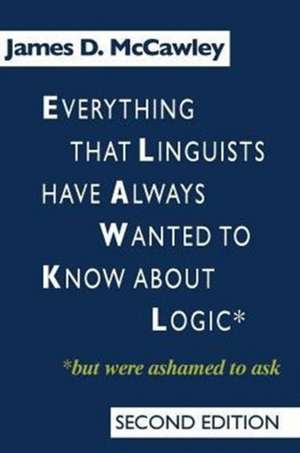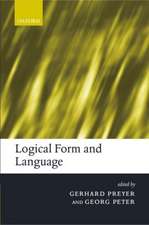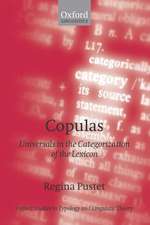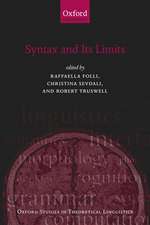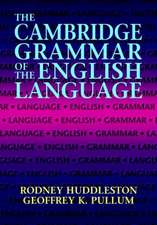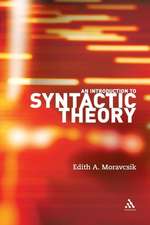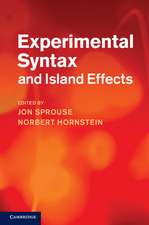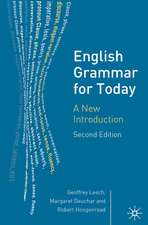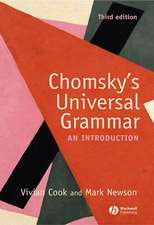Everything that Linguists have Always Wanted to Know about Logic . . . But Were Ashamed to Ask
Autor James D. McCawleyen Limba Engleză Paperback – 31 iul 1993
McCawley supplements his earlier book—which covers such topics as presuppositional logic, the logic of mass terms and nonstandard quantifiers, and fuzzy logic—with new material on the logic of conditional sentences, linguistic applications of type theory, Anil Gupta's work on principles of identity, and the generalized quantifier approach to the logical properties of determiners.
Preț: 515.04 lei
Nou
Puncte Express: 773
Preț estimativ în valută:
98.55€ • 107.39$ • 83.05£
98.55€ • 107.39$ • 83.05£
Carte tipărită la comandă
Livrare economică 23 aprilie-07 mai
Preluare comenzi: 021 569.72.76
Specificații
ISBN-13: 9780226556116
ISBN-10: 0226556115
Pagini: 656
Ilustrații: Illustrations
Dimensiuni: 152 x 229 x 38 mm
Greutate: 0.89 kg
Ediția:1
Editura: University of Chicago Press
Colecția University of Chicago Press
ISBN-10: 0226556115
Pagini: 656
Ilustrații: Illustrations
Dimensiuni: 152 x 229 x 38 mm
Greutate: 0.89 kg
Ediția:1
Editura: University of Chicago Press
Colecția University of Chicago Press
Notă biografică
James D. McCawley is the Andrew MacLeish Distinguished Service Professor in the Departments of Linguistics and East Asian Languages and Civilizations at the University of Chicago.
Cuprins
Preface to the Second Edition
Preface to the First Edition
1. The Subject Matter of Logic
1.1. Logic and "Logical Form"
1.2. On the Nature of Propositions
1.3. Ambiguity
1.4. Logic and the Division of Labor
1.5. Some Syntactic Prerequisites
Exercises
2. Predicate Logic I: Syntax
2.1. The Notion of "System of Formal Logic"
2.2. Quantifiers, Predicates, and Variables
2.3. Coherence Conditions on Variables
2.4. The Logicians' Favorite Quantifiers
2.5. Rules of Inference
Exercises
3. Propositional Logic I: Syntax
3.1. Propositional Connectives and Their Formation Rules
3.2. Rules of Inference
3.3. Axiom versus Rule of Inference versus Meaning Postulate
3.4. More on If
3.5. More on Conjunction
3.6. On the Structure of Proofs
3.7. Predicate Logic Supplemented by Propositional Logic
Exercises
4. Propositional Logic II: Semantics
4.1. Truth Tables
4.2. How Do the Rules of Inference Constrain Truth Values?
4.3. Language and Metalanguage
4.4. Different Kinds of Completeness
4.5. Appendix A: More on Metalanguage
4.6. Appendix B: Sketch of a Proof of Semantic Completeness
Exercises
5. A Digression into Set Theory
5.1. The Notion of "Set"
5.2. Operations on Set
5.3. Finite and Infinite Sets
5.4. Relations and Functions
5.5. Ensembles
5.6. Valuations
5.7. Proof by Induction
Exercises
6. Predicate Logic II: Semantics
6.1. Truth in Predicate Logic
6.2. Predicate Logic with Identity
6.3. Vacuous Truth and Pragmatic Restrictions on Domains
6.4. Restricted and Unrestricted Quantifiers
6.5. Satisfiability and Validity
Exercises
7. Further Topics in Predicate Logic
7.1. Linguistic Justification for S: Q'S
7.2. Russell's Analysis of the
7.3. Sets in the Object Language; Extended Predicate Logic
7.4. Other Quantifiers
7.5. Mass Expressions
7.6. Polyadic Quantifiers
Exercises
8. Sorts, Types, and Kinds
8.1. The Uniformity of the Domain; Sorts
8.2. Logical Types; Lambda Calculus
8.3. Kinds; Generic Propositions
8.4. Convergent ("Branching") Quantifiers
8.5. Conjunctions and Quantifiers
Exercises
9. Speech Acts and Implicature
9.1. Speech Acts and Illocutionary Force
9.2. Conversational Implicature: Grice Saves
9.3. Conventional Implicature
Exercises
10. Presupposition
10.1. Kinds of Presupposition
10.2. Some Possible Cases of Semantic Presupposition
10.3. Supervaluations
10.4. Pragmatic Presupposition
10.5. Broad and Narrow Conceptions of Falsehood
10.6. Discourse Referents
Exercises
11. Modal Logic
11.1. Notions of Necessity
11.2. Syntax and Semantics for Modal Propositional Logic
11.3. Modal Predicate Logic
11.4. Strict Implication and Relevant Entailment Logic
11.5. Appendix: Converses of Theorems
Exercises
12. Applications of Possible Worlds
12.1. "World-Creating" Predicates
12.2. Tense Logic
12.3. More on the Structure of Proofs
Exercises
13. Many-Valued and Fuzzy Logic
13.1. Values between True and False
13.2. Fuzzy Predicate Logic
13.3. Fuzzy Sets
13.4. Degrees of Truth
13.5. Dimensions of Truth
Exercises
14. Intensional Logic and Montague Grammar
14.1. Intensional Logic
14.2. Montague's Approach to Syntax and Semantics
14.3. "Generalized Quantifiers"
Exercises
15. Conditional Propositions
15.1. Counterfactual Conditionals
15.2. Indicative Conditionals
Exercises
Notes
References
List of Symbols
Index
Preface to the First Edition
1. The Subject Matter of Logic
1.1. Logic and "Logical Form"
1.2. On the Nature of Propositions
1.3. Ambiguity
1.4. Logic and the Division of Labor
1.5. Some Syntactic Prerequisites
Exercises
2. Predicate Logic I: Syntax
2.1. The Notion of "System of Formal Logic"
2.2. Quantifiers, Predicates, and Variables
2.3. Coherence Conditions on Variables
2.4. The Logicians' Favorite Quantifiers
2.5. Rules of Inference
Exercises
3. Propositional Logic I: Syntax
3.1. Propositional Connectives and Their Formation Rules
3.2. Rules of Inference
3.3. Axiom versus Rule of Inference versus Meaning Postulate
3.4. More on If
3.5. More on Conjunction
3.6. On the Structure of Proofs
3.7. Predicate Logic Supplemented by Propositional Logic
Exercises
4. Propositional Logic II: Semantics
4.1. Truth Tables
4.2. How Do the Rules of Inference Constrain Truth Values?
4.3. Language and Metalanguage
4.4. Different Kinds of Completeness
4.5. Appendix A: More on Metalanguage
4.6. Appendix B: Sketch of a Proof of Semantic Completeness
Exercises
5. A Digression into Set Theory
5.1. The Notion of "Set"
5.2. Operations on Set
5.3. Finite and Infinite Sets
5.4. Relations and Functions
5.5. Ensembles
5.6. Valuations
5.7. Proof by Induction
Exercises
6. Predicate Logic II: Semantics
6.1. Truth in Predicate Logic
6.2. Predicate Logic with Identity
6.3. Vacuous Truth and Pragmatic Restrictions on Domains
6.4. Restricted and Unrestricted Quantifiers
6.5. Satisfiability and Validity
Exercises
7. Further Topics in Predicate Logic
7.1. Linguistic Justification for S: Q'S
7.2. Russell's Analysis of the
7.3. Sets in the Object Language; Extended Predicate Logic
7.4. Other Quantifiers
7.5. Mass Expressions
7.6. Polyadic Quantifiers
Exercises
8. Sorts, Types, and Kinds
8.1. The Uniformity of the Domain; Sorts
8.2. Logical Types; Lambda Calculus
8.3. Kinds; Generic Propositions
8.4. Convergent ("Branching") Quantifiers
8.5. Conjunctions and Quantifiers
Exercises
9. Speech Acts and Implicature
9.1. Speech Acts and Illocutionary Force
9.2. Conversational Implicature: Grice Saves
9.3. Conventional Implicature
Exercises
10. Presupposition
10.1. Kinds of Presupposition
10.2. Some Possible Cases of Semantic Presupposition
10.3. Supervaluations
10.4. Pragmatic Presupposition
10.5. Broad and Narrow Conceptions of Falsehood
10.6. Discourse Referents
Exercises
11. Modal Logic
11.1. Notions of Necessity
11.2. Syntax and Semantics for Modal Propositional Logic
11.3. Modal Predicate Logic
11.4. Strict Implication and Relevant Entailment Logic
11.5. Appendix: Converses of Theorems
Exercises
12. Applications of Possible Worlds
12.1. "World-Creating" Predicates
12.2. Tense Logic
12.3. More on the Structure of Proofs
Exercises
13. Many-Valued and Fuzzy Logic
13.1. Values between True and False
13.2. Fuzzy Predicate Logic
13.3. Fuzzy Sets
13.4. Degrees of Truth
13.5. Dimensions of Truth
Exercises
14. Intensional Logic and Montague Grammar
14.1. Intensional Logic
14.2. Montague's Approach to Syntax and Semantics
14.3. "Generalized Quantifiers"
Exercises
15. Conditional Propositions
15.1. Counterfactual Conditionals
15.2. Indicative Conditionals
Exercises
Notes
References
List of Symbols
Index
